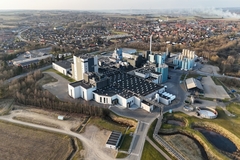
- Industry news
Industry news
- Category news
Category news
- Reports
- Key trends
- Multimedia
- Journal
- Events
- Suppliers
- Home
- Industry news
Industry news
- Category news
Category news
- Reports
- Key trends
- Multimedia
- Events
- Suppliers
USDA sends US$221.2M aid to Hurricane Helene-battered farms in North Carolina

US Deputy Secretary of Agriculture Stephen Alexander Vaden has met with agricultural leaders and producers in North Carolina and revealed additional US Department of Agriculture (USDA) assistance to help recover from Hurricane Helene.
Hurricane Helene struck the Southeastern US in late September 2024. It made landfall on September 26, 2024, in the Florida Panhandle as a Category 4 hurricane.
The storm then moved north into Georgia, the Carolinas, Tennessee, Kentucky, and Virginia, causing catastrophic flooding, wind damage, and widespread agricultural losses.
According to the National Oceanic and Atmospheric Administration, at least US$3 billion in crop production losses occurred across the Southeast US. This figure excludes associated infrastructure, livestock, and equipment damages, indicating the total agricultural impact is far higher.

As a result, North Carolina was among the hardest-hit states by Hurricane Helene. Last week, Deputy Secretary Vaden signed a block grant agreement with the North Carolina Department of Agriculture and Consumer Services (NCDA&CS) that provides recovery assistance to eligible North Carolina farmers. In July, US Secretary of Agriculture Brooke L. Rollins announced additional disaster assistance for farmers and producers in Virginia and Florida.
Disaster relief
As part of the agreement, NCDA&CS will receive US$221.2 million in funding to administer a program that will cover eligible infrastructure and timber losses in addition to eligible market losses and eligible future year revenue losses. This funding is part of the US$30 billion disaster assistance relief effort authorized by the American Relief Act, 2025.
According to Secretary Brooke Rollins, America’s farmers and ranchers across the Southeast and North Carolina have been “hit hard” and suffered significant economic losses during 2024.
USDA has worked closely with the State of North Carolina to ensure those impacted have the necessary relief.
“We are working quickly to get these much-needed relief funds to those who need to rebuild. This is one part of our daily actions to ensure our farmers have the resources they need to continue to produce the safest, most reliable, and most abundant food supply in the world,” comments Rollins.
“The announcement is about delivering on our promise to stand shoulder to shoulder with America’s farmers in times of need,” notes Deputy Secretary Stephen Vaden. “By signing this block grant with North Carolina, the USDA is ensuring producers have the resources to rebuild stronger after Hurricane Helene and to keep producing the food and fuel our nation depends on.”
“Under President Trump’s leadership, we are moving quickly to cut red tape, get relief dollars into the hands of those who need it most, and protect the backbone of our rural economy, our family farms.”
“Welcome” news
Meanwhile, North Carolina Agriculture Commissioner Steve Troxler says the US$221.2 million federal disaster assistance block grant for agricultural damage due to Hurricane Helene is welcome news to North Carolina farmers who have been holding on in the aftermath of massive agricultural losses in 2024.
 USDA is working with 14 states, including North Carolina, to develop and implement block grants to address each state’s unique disaster recovery needs.“We are grateful for USDA’s continued efforts on this block grant and appreciate their willingness to partner with us on this much-needed assistance,” he says.
USDA is working with 14 states, including North Carolina, to develop and implement block grants to address each state’s unique disaster recovery needs.“We are grateful for USDA’s continued efforts on this block grant and appreciate their willingness to partner with us on this much-needed assistance,” he says.
“We all have an interest in the success of agriculture because farmers produce the food we all depend on.”
Farming grants
Previous moves USDA has made to boost North American agriculture include issuing up to US$10 billion in aid directly to agricultural producers for the 2024 crop year amid surging input costs and falling commodity prices. The payment was disbursed through the Emergency Commodity Assistance Program to help producers overcome cost pressures.
Meanwhile, in April, the USDA discontinued North America’s climate-smart farming grants initiated under the Biden administration. However, select projects aligned with President Trump’s government may continue under a new Advancing Markets for Producers initiative.










